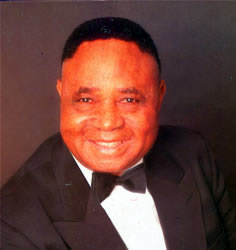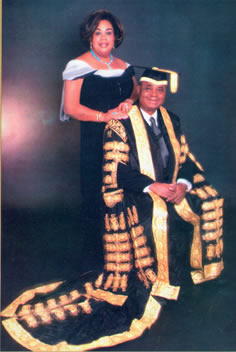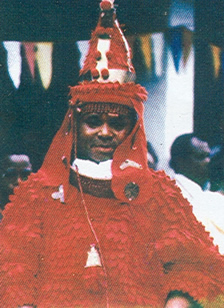| HOMEPAGE | BENIN THE HOME OF HEROES | FROM CRADLE TO BOYHOOD AND EARLY PUBLIC LIFE | THE BIRTH OF A DREAM | PRINCIPAL VENTURES |
| E-mail LOGIN |

 |
 |
THE ESAMA OF BENIN KINGDOM |
 |
The Great Life of A Pioneer |
Igbinedion as a Benin family name is now a household word. It has become synonymous with Aviation, Industry, Education, Finance, Medical Care and Rural Development at local, national and international levels. The man who has made this possible in Africa is Sir (Dr.) Chief Gabriel Osawaru Igbinedion, the Esama of Benin Kingdom. Chief Igbinedion has attained great heights in life reminiscent of great achievers. He is a philanthropist and and a humanist of national dimensions and an industrialist of international fame...read on |
IGBINEDION-THE PHILOSOPHICAL PERSPECTIVE
(iv) IGBINEDION ON NIGERIA AND THE DIASPORA Chief Igbinedion's philosophy extends beyond the boundaries of domestic concepts into the international realm. He believes that the black race has made tremendous contributions to the development and enhancement of world civilization and that it promises to remain a force of great significance with time. Chief Igbinedion recognises the adverse impact of the slave trade on black culture and believes that in spite of all, the black race has a promise. The concept was expressed in his address at Rust College, Mississippi, USA 1988, while receiving the award of honorary degreee of Doctor of Philosophy in Law from the institution. In his address he said: "I feel honoured today to have been recommended by the Jackson State University for the award of the degree of Doctor of Philosophy in Law at a College of such high reputation as the Rust College. I feel even more honoured to be among the few selected the world over to be honoured this very day, the 122nd Anniversary of Rust College Founder's Day, because I see the award as a recognition of my near emotional attachment to this great institution. I thank you most sincerely for the honour being done to me.' I am grateful also to the Rust College's Board of Trustee for the award. A situation like this usually demands a response address from the recipient. Let me attempt to address the role of Africa in sustaining excellence in American culture, the sub-theme of this celebration. Such an address must contain a reference to early Afro-American relations which began with the slave trade. Have we both gained from the slave trade? I know you might feel bored to listen to this be-laboured topic, but spare me your indulgence for a few minutes, because to me the issue of the slave trade remains an emotional one, and the corner-stone of the excellence of American culture. As you all know the Atlantic slave trade began in 1530 following the appeal made a decade earlier by the Franciscan Jesuit Batholomew de las Casas. The Catholic priest appealed for the importation of black labour from Africa to replace the fragile Indian population of Latin America who could not withstand the hardship in the mines and plantations. By the end of the slave trade in the 19th century some 40 million Africans had been shipped to the Americas, about half of whom actually got to the mines and plantations in which unfortunately a sizeable percentage also lost their lives. While the Africans transported to America were undergoing a harrowing experience lucidly explained for instance in Alex Haley's Roots, the African Continent itself was left depopulated, devastated and dehumanised. The African either in Africa or America became broken and lost faith in himself and his creative ability and other attributes he had acquired over centuries of independent rule. In either case, the life of the black man became characterised by insecurity and colonialism. The point I am making my respected audience is that the slave trade was hazardous to the development of the African person be it in Africa or America. Yet it formed the foundation for the American culture of dedicated labour and national service. But all that is now in the past, one might be tempted to say. Yet for an effective assessment of the present to be made I believe an acknowledgement of the past is vital. That is why I have referred to the slave trade. Now let me discuss the present. You Africans in America otherwise known as the Negroid or black Americans have made tremendous progress in spite of your difficult background. Right from the period of your emancipation in the 18th and 19th centuries, you blacks in America have struggled side by side with your white counterparts to oil the American machinery of progress and advancement. You blacks fought alongside the whites in the American Freedom War of 1775 to 1783; you participated effectively in the American war of Unity of 1865 and more recently you fought gallantly in defence of American integrity in the First and Second World Wars and the Vietnam conflict. Scientifically, you blacks have participated even in space exploration and have contributed immensely to scientific inventions and discoveries for which the United States of America is a foremost nation. Your contributions to scientific establishments including the Rust College testify to your determination to make your presence felt in this country in spite of your disadvantaged beginning. In the field of sports and music I dare say that without you, the position of the United States of America could have been anyone's guess. This is an area in which the African connection with the American Negro has contributed most visibly to sustaining the excellence in American culture. Since sports and music constitute a worthwhile part of American international honour and culture and Africa has contributed immensely to these, the place of Africans in sustaining the heritage of excellence of the United States is not in doubt. Politically, the recent American presidential campaigns that featured our son Jesse Jackson climaxed black participation in American politics. On behalf of my humble self and my country Nigeria, I salute you blacks of America for your noble achievements, and for bringing the African culture to bear on the culture of the New World. Now what about we your black brothers you left behind in Africa? Your brothers in Africa have also pushed ahead in spite of the disadvantages of the slave trade and the subsequent colonialism. It is true that the history of Africa has been punctuated by political instability and economic weakness, but with barely three decades of political freedom heavily undermined by economic dependence, African achievements cannot but be described as fairly reasonable. In my country, Nigeria for instance, the measures being taken to curb the political instability and economic problems so far experienced are a reflection of our determination to achieve self-realisation and actualisation, the end result of which can only contribute to the overall emancipation of our people. The political programme and the Structural Adjustment Programme being pursued by the Nigerian Government are aimed at achieving this goal. Amidst these great obstacles Nigeria still contributes immensely to the cultural scientific advancement of contemporary world. Today, Nigeria's standard of education ranks among the best in the world. Nigerians trained in or outside Nigeria make useful impact wherever they serve. Modesty and courtesy will not allow me to discuss this aspect much further, but I do know that the Nigerians amongst you here and elsewhere in the United States always endeavour to live up to expectations. Perhaps I need to mention that the contributions of Nigerians to literary knowledge have attained worldwide acclaim with the recent Nobel prize awarded to Professor Wole Soyinka. Nigerian writers like Chinua Achebe, Cyprian Ekwensi and Festus Iyayi are some of our writers who have also achieved world fame. In the field of medicine, Professor Adeoye Lambo, the Deputy Director of the World Health Organisation (WHO) and Professor Olikoye Ransome Kuti, Nigeria's Minister of Health, who won a prize recently are two of the several Nigerians with worldwide reputation in medicine. On the business plane a number of Nigerian businessmen including my humble self are doing their best despite the difficulty of the Nigerian economy. We thank the American Government and people for the support and encouragement they are giving to us in this connection. I hope sincerely, that the Honorary degreee of Doctor of Philosophy in Law being conferred on me today by this great institution will help to strengthen the academic as well as the business ties between our two peoples." Chief Igbinedion also noted the progressive strides made so far by contemporary black Americans on the one hand and Nigerians on the other and hoped that both groups would endeavour to find common grounds for cooperation. By receiving an award from the United States and calling on both nations to co-operate for the common good of all, Chief Igbinedion was playing the role of an ambassador of goodwill and a promoter of international understanding.
|
(ii) IGBINEDION ON CHIEFTAINCY TITLE AND NATIONAL UNITY (iii) IGBINEDION - OUR BROTHER'S KEEPER (iv) IGBINEDION ON NIGERIA AND THE DIASPORA (v) IGBINEDION ON NIGERIA AND CHRISTIANITY (vi) IGBINEDION ON DR. MARTIN LUTHER KING JR. (vii) IGBINEDION ON LIVING TO WIN IN LIFE AND BUSINESS
|
| A great son of Africa who has become a towering international success. This is the powerful moving biography of one man's determination to win- H. R. H. Oba Lamidi Adeyemi lll, The Alaafin of Oyo |
| This remarkable biography weaves the story of an endlessly fascinating man, his family and business empire- Dr. Brian Aghedo PhD |
| Do you have what it takes to be an industrialist, businessman and philanthropist? Chief Gabriel Osawaru Igbinedion's life story tell how, withouth mortaginng your soul- Chief Pearnel Charles, Jamaica |
| Sir Igbinedion is a great man of trmemendous and unqualified resources. His humility and great service to humanity coupled with his willingness to help the less-privileged has earned him respect and admiration the world over- Prince Abubakar Audu, former executive governor of Kogi State, Nigeria. |
| Igbinedion does not believe in failure, he says, "don't be afraid, everyone has them and sometimes they can be resurrected with resounding success- Alfred Eghobamien Esq.SAN |
![]() Afew Acknowledgement of Chief Igbinedion's Sense of Philanthropy
Afew Acknowledgement of Chief Igbinedion's Sense of Philanthropy


